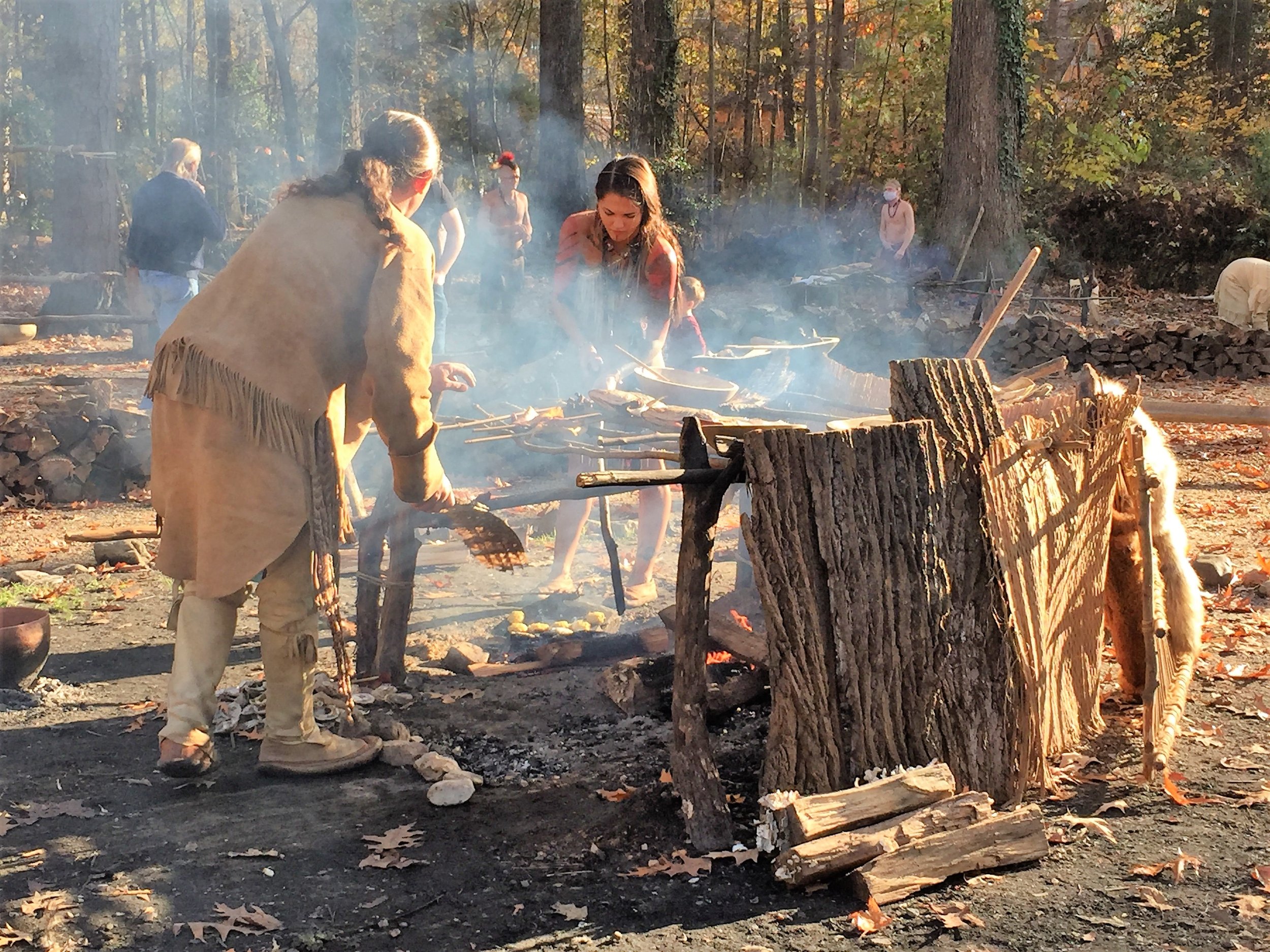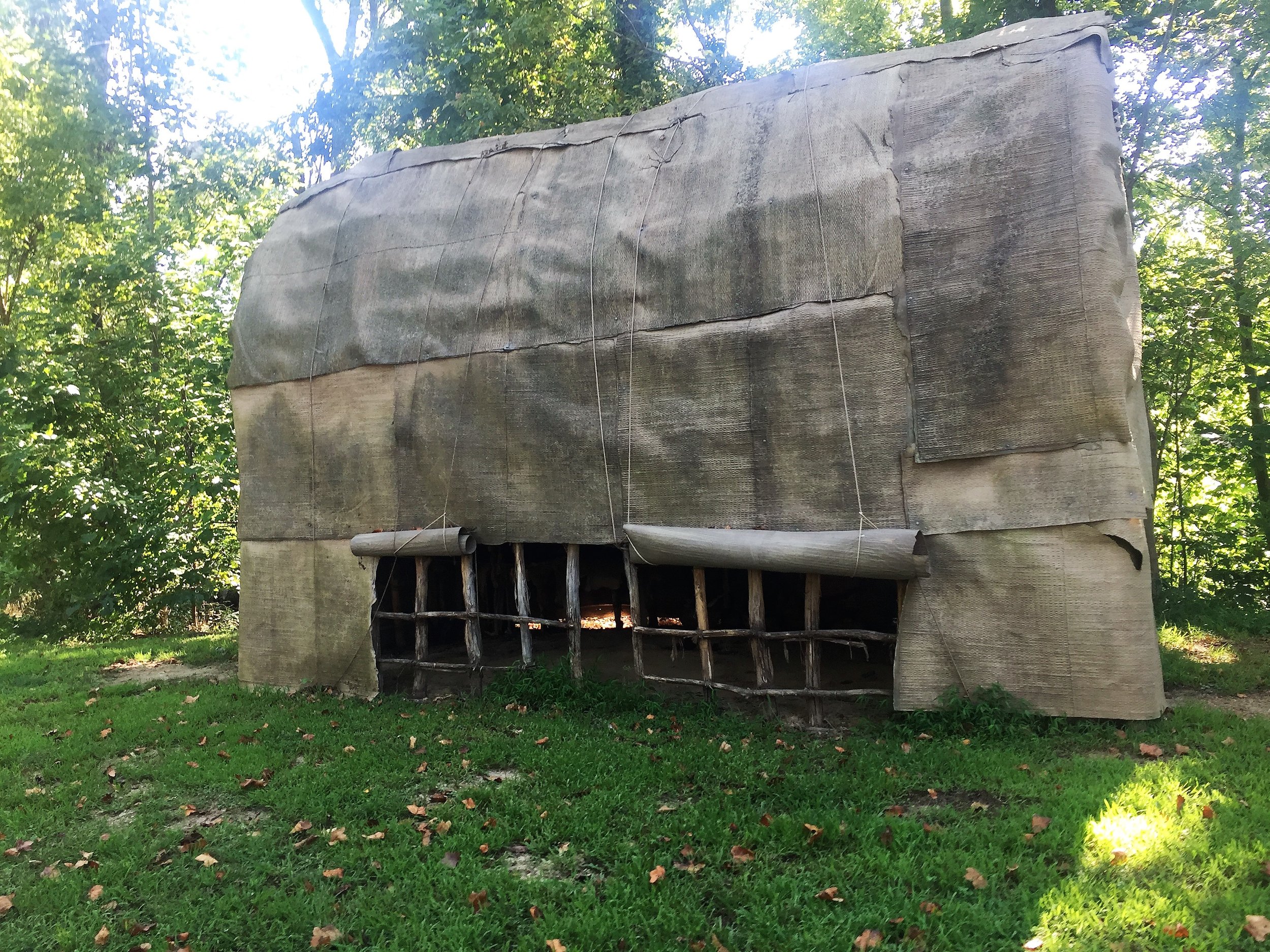Quotes from Smith’s Writings
Indians
As for the coronation of Powhatan and his presents … and such costly novelties, they had been much better well spared than so ill spent. For we had his favor much better only for a poor piece of copper till this stately kind of soliciting made him so much overvalue himself that he respected us as much as nothing at all. (Proceedings, p. 42)
[While I was president] many were billeted among the savages, whereby we knew all their passages, fields, and habitations, how to gather and use their fruits as well as themselves. (Proceedings, p. 89)
This honest, proper, good promise-keeping king [of Quiyoughquohanock] of all the rest did ever best affect us, and though to his false Gods he was yet very zealous, yet he would confess our God as much exceeded his as our guns did his bow and arrows, often sending our president many presents to pray to his God for rain or his corn would perish, for his Gods were angry. (Proceedings, p. 90)
Part of the recreated Arrohattock town at Henricus.
That disorderly company [the settlers brought by Francis West] so tormented those poor naked souls by stealing their corn, robbing their gardens, beating them, breaking their houses, and keeping some prisoners, that they daily complained to Captain Smith he had brought them for protectors worse enemies than the Monacans. (Proceedings, p. 97)
The land is not populous for the men be few. Their far greater number is of women and children. Within sixty miles of Jamestown there are about 5000 people, but of able men fit for their wars scarce 1500. (The Generall Historie, 2, p. 29)
The people differ very much in stature, especially in language … of a color brown when they are of any age but they are born white. Their hair is generally black, but few have any beards. (The Generall Historie, 2, p. 30)
The Susquehannock chieftain as portrayed on the Smith map, 1612
They are inconstant in everything but what fear constraineth them to keep. Crafty, timorous, quick of apprehension, and very ingenuous. Some are of disposition fearful, some bold, most cautelous, all savage, generally covetous of copper, beads, and such like trash. (The Generall Historie, 2, p. 30)
These Massawomecks are a great nation and very populous. The tribes at the heads of all those rivers… are continually tormented by them, of whose cruelty they generally complained and very importunate they were with me and my company to free them from these tormentors. To this purpose they offered food, conduct, assistance, and continual subjection, which I concluded to effect. But the council then present [at Jamestown] emulating my success would not think it fit to spare me forty men to be hazarded in those unknown regions. (The Generall Historie, 2, p. 33)
Commodities they have as skins, fowl, fish, flesh, and their country corn—victuals are their chiefest riches. (The Generall Historie, 2, p. 34)
They think that their werowances and priests which they also esteem [divine] when they are dead do go beyond the mountains towards the setting of the sun … doing nothing but dance and sing with their predecessors …But the common people they suppose shall not live after death but rot in their graves like dead dogs. (The Generall Historie, 2, p. 36/37)
If upon the coast of America they do not [by autumn] furnish themselves with two or three thousand bushels of Indian corn, which is better than ours, and in a short time cause the savages to do them as good service as their own men (as I did in Virginia) and yet neither use cruelty nor tyranny amongst them … till it be, they will hardly do well. (Advertisements, p. 30)
Powhatan interpreters at Jamestown Settlement.
Although the country people be very barbarous, yet have they amongst them such government as that their magistrates for good commanding and their people for due subjection and obeying excel many places that would be counted very civil. (Generall Historie, 2, p. 37)
The command from England was so strait not to offend [Indians] as our authority bearers (keeping their houses) would rather be anything than peace-breakers,. This charitable humor prevailed till well it chanced they meddled with Captain Smith. (The Generall Historie, 3, p. 54)
But this is my torment that if I escape them [Indians], our malicious council with their open-mouthed minions will make me such a peace-breaker … as will break my neck. (The Generall Historie, 3, p. 79)
An oyster shell midden at Henricus. The Powhatan Indians roasted or boiled oysters and sometimes traded the shells.
I see you Pamunkeys the great desire you have to kill me and my long suffering your injuries hath emboldened you to this presumption. The cause I have forborne your insolencies is the promise I made you before the God I serve to be your friend till you give me just cause to be your enemy. If I keep this vow, my God will keep me, you cannot hurt me. If I break it, he will destroy me. (The Generall Historie, 3, p. 79 ; Proceedings, p. 70)
It was the Spaniards’s good hap to happen in those parts where were infinte numbers of people who had manured the ground with that providence it afforded victuals at all times … and had the use of gold and silver … But we chanced in a land even as God made it where we found only an idle, improvident, scattered people, ignorant of the knowledge of god or silver or any commodities and careless of anything but from hand to mouth except baubles of no worth. (The Generall Historie, 3, p. 82)
Totems at Jamestown Settlement
But the worst was that the poor savages that daily brought in their contribution to the president that disorderly company [of colonists] so tormented those poor souls [Indians] by stealing their corn, robbing their gardens, beating them, breaking their houses and keep some prisoners that they [Indians] daily complained to Captain Smith he had brought them for protectors worse enemies than the Monacans themselves. (The Generall Historie, 3, p. 91)
In the wake of the 1622 massacre: Where before we were troubled in clearing the ground of great timber, which was to them of small use, now we may take their own plain fields and habitations, which are the pleasantest places in the country. Besides, the deer, turkeys, and other beasts and fowls will exceedingly increase if we beat the savages of the the country, for at all times of the year they never spare male nor female, old nor young, eggs nor birds, fat nor lean, in season or out of season with them, all is one. The like they did in our swine and goats, for they have used to kill eight in ten more than we, or else the wood would most plentifully abound with victual. Besides, it is more easy to civilize them by conquest than fair means, for the one may be made at once, but their civilizing will require a long time and much industry. (The Generall Historie, 4, p. 147)
I would not give twenty pound for all the pillage is to be got amongst the savages in twenty years. (The Generall Historie, 4, p. 153)
Of the elusiveness of Indians: It may cause some to suppose they are grown invincible, but will any go to catch a hare with a tabor and pipe? (The Generall Historie, 4, p. 155)
A 17th-century copper kettle, a desirable trade good to the Powhatans from the Jamestown settlers.
Ever since the beginning of these plantations it hath been supposed the king of Spain would invade them or our English Papists endeavor to dissolve them. But neither all the councils of Spain nor Papists in the world could have devised a better course to bring them all to ruin than thus to abuse their friends [among the Indians]. (The Generall Historie, 4, p. 157)
Of encountering Indians: Twelve men with myself I found sufficient to go where I would adays and surprise a house with the people if not a whole town in a night, or encounter all the power they could make as a whole army. (The Generall Historie, 4, p. 159)
Having now such liberty to do to the savages what they will [which earlier] the others had not, I more than wonder they have not five hundred savages to work for them. GH4-167For a labor supply in New England: The assistance of the savages, which may easily be had if they be discreetly handled in their kinds towards fishing, planting, and destroying woods. (The Generall Historie, 5, p. 213)
The wild hogs, which were infinite, are destroyed and eaten by the savages. (True Travels, p. 43)
For a copper kettle and a few toys as beads and hatchets, they will sell you a whole country, and for a small matter their houses and the ground they dwell upon. (Advertisements, p. 10)
I never saw nor heard of any nation in the world which had not religion, deer, bows, and arrows. (Advertisements, p. 14/15)







